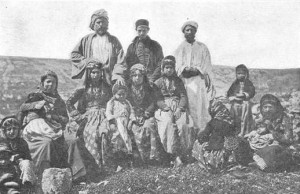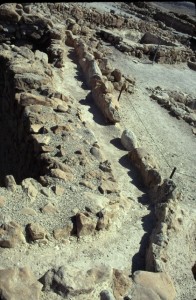Eruv and Sectarianism in Ancient Judaism: The Book of Jubilees
So far we have seen that the prohibition on carrying from domain to domain is widespread in the Dead Sea Scrolls literature. But we have argued above that this is part of a wider trend in Jewish law. To convince you that this is correct, and that in general the priestly trend, that is, the Zadokite-Sadducee approach, takes this view, we will now look at parallels from the book of Jubilees. This is a text that was composed somewhere between 180 B.C.E. and the Maccabean revolt (168-164 B.C.E.) of which a number of fragmentary manuscripts are found in the Dead Sea Scrolls. Unfortunately, the passages we will discuss here are not preserved in Second Temple period manuscripts but derive from the ancient Ethiopic translation probably via Greek.
The prohibition of carrying appears in Jubilees in two separate collections of Sabbath laws. Jubilees 2:29-30 states:
(29) …(That it is not lawful to) draw water, or bring in or take out thereon (i.e., on the Sabbath) through their gates any burden, which they had not prepared for themselves on the sixth day in their dwellings. (30) And they shall not bring in or take out from house to… Continue reading
Outside the Bible
My conversation with Rabbi Barry Schwartz, JPS Director, about my role as Editor of Outside the Bible, a groundbreaking JPS anthology of second temple literature to be released in 2013.
Eruv and Sectarianism in Ancient Judaism: Parallel Passages
With the full publication and release of the Dead Sea Scrolls, two additional sources pertaining to the subject of this presentation have become available. The first is in a passage in 4Q251, Halakha A, which I edited together with Erik Larson and the late Manfred Lehmann. The fragmentary passage first contains an apparent prohibition of drawing water on the Sabbath from a cistern and then continues as follows:
[let no] one carry (anything) out of his place for the entire Sabbath [from the outside to the house] and from the house to the ou[tside…
This text is actually a collection of various laws, and it is not possible to understand exactly by what criteria our passage was included. It is of course parallel to Zadokite Fragments 11:1-2.
A second text, 4Q265, Miscellaneous Rules includes a whole variety of Qumran laws, some from the Rule of the Community and some from the Zadokite Fragments. Here we find the following:
Let no on[e] ca[rry out] any vessel or foo[d] from his (or her) tent on the day of the Sabbath.
Clearly, this is again a prohibition on the carrying of anything (I take the term “vessel” to be… Continue reading


